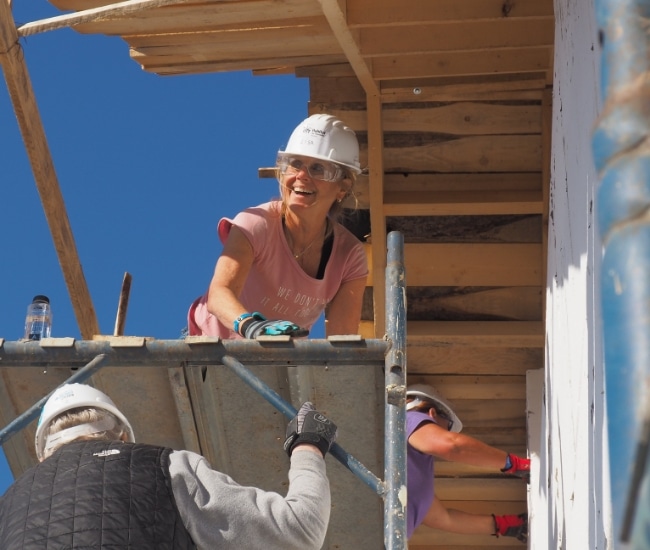What is a self-build warranty?
A self-build warranty is specifically designed for individuals who are undertaking a self-build project.
It provides financial protection against structural defects that may arise in the property during the construction phase or within a specified period after completion. It essentially acts as an insurance policy, covering the costs of repairing or replacing faulty materials or poor workmanship.
How does a self-build structural warranty work?
If you discover a structural defect within the 10-year warranty period, you can file a claim. CIR’s team of experts will investigate the issue to determine if it’s covered by the warranty.
If it is, we’ll work closely with you to ensure the problem is rectified, ensuring your home remains structurally sound.
What is classed as a “self-build” property?
For the purposes of a self-build structural warranty, a “self-build” property is generally defined as a residential property that is built by the owner or a group of owners. This includes:
- New Builds: Houses, bungalows, flats, and other residential buildings constructed from scratch.
- Conversions: Conversions of existing buildings, such as barns or outbuildings, into residential properties.
- Major Refurbishments: Significant renovations or extensions to existing residential properties.
Do I need a self-build warranty?
A self-build warranty is a type of insurance policy that protects your home against structural defects for a set period, typically 10 years. While not strictly required by law, it is highly recommended for a number of reasons:
- Mortgage approval: Most lenders will require a self-build warranty as a condition of granting a mortgage on this type of property. This is because it provides them with assurance that the property is structurally sound and reduces their risk.
- Protection against defects: A warranty gives you peace of mind that you are safeguarded against potential structural defects that may arise during the construction process or within the warranty period.
- Resale value: Having a warranty in place can significantly enhance the resale value of your property. Potential buyers may be more willing to purchase a home with a warranty as it offers them peace of mind.
Can you sell a self-build property without a warranty?
While it is technically possible to sell a self-build property without a structural warranty, it can lead you to facing particular challenges.
Whether you’re planning to sell the property and the buyers need a mortgage, or you intend to use the residential property to raise capital, it will be very difficult without the correct warranty in place.
Therefore, it is generally advisable to have a self-build warranty in place, both for securing a mortgage and for facilitating a smooth sale of your property in the future.
What does a self-build warranty cover?
A typical self-build warranty provides coverage for a specified period, usually 10 years, against defects. What is covered depends on where you are in your policy, as there are two periods with different levels of protection.
The first period of cover, also known as the defect period, spans across the first two years once the self-build has been completed. This will usually cover:
- Structural elements: This includes issues related to the foundation, walls, floors, and roof, ensuring the overall stability of the building.
- Water ingress: Protection against water damage caused by faulty plumbing, roofing, or waterproofing systems.
- Electrical and mechanical systems: Coverage for defects in wiring, plumbing, and heating systems.
- Design and workmanship: Protection against errors or omissions in the design and construction process.
The second period of this policy is also known as the structural insurance period, and will cover you from years 3-10. Within this timeframe of your policy you will usually be covered for:
- Foundation problems: Cracks, subsidence, or instability.
- Load-bearing wall failures: Issues with walls that support the weight of the building.
- Roof structure defects: Problems with the roof’s framework or covering.
It is important to note that coverage and terms vary between providers so it is important to review policy documents carefully to understand the specific protection offered for your case.
How long does a self-build warranty last?
A self-build warranty typically lasts 10 years, covering structural defects. However, specific terms and conditions can vary, so it’s crucial to review the policy carefully to understand the extent of the protection it offers.
It is also important to understand that many warranties can in fact be transferred to new owners, but it’s essential to check the specific terms.
It is also worth noting that there are factors that may invalidate a self-build warranty, which can include alterations made without the insurer’s consent, failure to maintain the property adequately, or using materials or construction methods not approved by the insurer.
When should I get a self-build warranty?
The ideal time to get a self-build warranty is before you start building. This way, the insurance provider can review your plans and ensure they meet their standards, making the process smoother.
Getting a warranty early also allows you to budget for it correctly, meaning you can forecast your project much more effectively.
Whilst it is possible to get one later on in your project, it might work out more expensive and have restrictions.
Are there alternatives to self-build warranties?
Beyond traditional self-build warranties, there are alternative options that you can consider such as Professional Consultant Certificates (PCCs) or self-insurance.
- Professional Consultant Certificates (PCCs): These offer a more affordable and quicker solution, though they typically provide shorter coverage periods and may not cover as wide a range of issues as a full warranty.
- Building Control Approval: While ensuring compliance with building regulations, it doesn’t provide financial protection against defects or cover design flaws.
- Insurance: Tailored insurance policies can offer comprehensive coverage, including structural defects and liability, but they can be more expensive and require careful consideration of policy terms.
- Self-Insurance: This option provides complete control but also carries significant financial risk. It requires meticulous planning and budgeting to mitigate potential issues.
When choosing an alternative, consider your budget, risk tolerance, lender requirements, and specific coverage needs. Consulting with a financial adviser or insurance broker can help you make an informed decision.
What are the benefits of a self-build structural warranty?
When building a new residential property it is imperative to consider the potential risks involved. One way to protect your investment and provide peace of mind is by obtaining a self-build warranty.
Obtaining a self-build warranty for your project offers several benefits, including:
- Financial Protection: Safeguards your investment against potential structural defects, avoiding costly repairs.
- Mortgage Approval: Many lenders require a warranty as a condition for a mortgage, making it easier to secure financing.
- Enhanced Property Value: A warranty can increase your property’s value, making it more attractive to potential buyers.
- Expert Support: Warranty providers offer technical advice and support throughout the building process, ensuring compliance with building regulations.
- Future-Proofing: The warranty can be transferred to future owners, maintaining the property’s value and appeal.
By not getting a self-build warranty you could face a number of drawbacks over the first 10 years of the project’s lifecycle, such as:
- Increased financial risk – as you will be solely responsible for structural defects
- Less attractive to potential buyers – if you decide to sell your property due to uncertainty from prospective buyers
- Financial restrictions – as most lenders require warranty when offering mortgages
- Legal complications – if in the event of a structural issue, you may face legal disputes with contractors or suppliers, which can be time-consuming and costly.
By investing in a self-build warranty, you can safeguard your investment and enjoy the peace of mind that comes with knowing your home is protected.
How much does a self-build warranty cost?
Self-build warranty costs can vary depending on various factors. For instance, the size and cost of your project, the building method used, and your location can all affect the overall cost of your warranty.
Here at CIR, you can request a fast, efficient quote in just a few clicks. Or feel free to contact us on 0800 059 0150 to discuss your requirements.
How do I obtain a self-build structural warranty?
To obtain a self-build warranty, you’ll need to engage a reputable warranty provider, such as CIR. We will assess your project, including building plans and specifications, and conduct site inspections.
Once satisfied with the quality of construction and adherence to building regulations, we will issue a warranty certificate.
This certificate typically covers structural defects for a period of 10 years, providing peace of mind for both you and any future homeowners that you will be covered for a range of structural defects.
“Embarking on a self-build project is undoubtedly one of the most exciting and fulfilling endeavours that any ambitious self-builder can undertake,” says Oliver Griffiths, Divisional Director at CIR. “However, this type of project comes with its risks and these need to be carefully considered.
“The best way to protect yourself from unforeseen problems further down the line is to take out a self-build warranty. This type of structural warranty protects what is likely to be a significant investment from issues arising from the design, materials or workmanship of your project.”
Why choose CIR for your self-build warranty?
With a proven track record since 1986, CIR offers specialised 10 and 12-year structural warranties. Our self-build warranties are backed by specialist insurers and are trusted by the nation’s leading banks and building societies.
For added convenience, our fully digital policies make managing your self-build warranty quicker and easier.
Arrange a call back
Want us to call you back at a more convenient time? Drop us your details here and someone will be on touch at a more suitable time.

PROTECT YOUR INVESTMENT WITH A SELF-BUILD WARRANTY
Self-build projects offer unrivalled freedom and flexibility. However, it pays to protect your investment to ensure unexpected structural issues don’t turn your dream into a nightmare. With a 10-year self-build structural warranty from CIR, you can bring your vision to life, safe in the knowledge that your project is financially protected.

A SELF-BUILD WARRANTY THAT’S BUILT AROUND YOU
As experienced self-build warranty providers, we understand the unique requirements of self-build projects. Time is often of the essence. This is why we’ve developed our user-friendly online portal, which offers quick, convenient access to your self-build warranty. So you can manage your policy easily with zero stress or paperwork.

REASSURANCE FROM FOUNDATION TO FINISH AND BEYOND
Design, workmanship and material defects can affect even the most meticulous self-build project. Unforeseen latent defects can be costly to repair. When you’ve invested heavily in a self-build, any added expense can be damaging. A structural warranty from CIR gives you vital reassurance from foundation to finish and beyond.
Why CIR?
We're Committed to Transparency
Empowering you with access to all your information guarantees that we maintain the utmost levels of accountability and customer service.
Every email is carefully attended to, each phone call meticulously recorded for our mutual protection, and your documents are freely available to view on our portal at any time.
We are committed to transparency and openness, ensuring you have full visibility into every aspect of our interactions.
Arrange a callback
Want us to call you back at a more convenient time? Drop us your details here and we will be in touch at a more suitable time.
Resources & Guides







